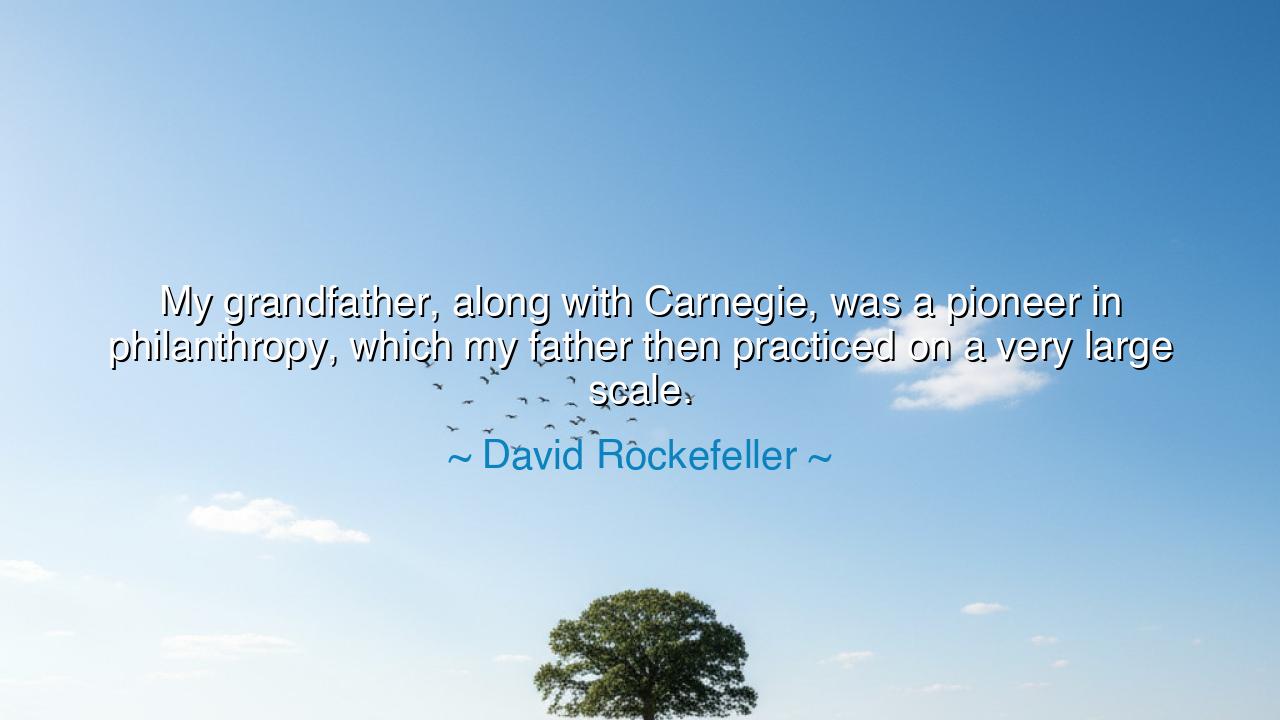
My grandfather, along with Carnegie, was a pioneer in
My grandfather, along with Carnegie, was a pioneer in philanthropy, which my father then practiced on a very large scale.






The words of David Rockefeller—“My grandfather, along with Carnegie, was a pioneer in philanthropy, which my father then practiced on a very large scale”—echo with the weight of lineage and the enduring call of noblesse oblige: the sacred duty of those blessed with abundance to serve the greater good. These words are not mere family pride, but a reflection of a truth older than wealth itself—that greatness is not measured by what one possesses, but by what one gives. In them we hear the ancient rhythm of legacy: the passing of virtue from one generation to the next, not in words, but in deeds.
In the age of the ancients, wealth was seen not only as privilege but as responsibility. The philosopher Seneca wrote that fortune is like a trust—given to some, not for their indulgence, but for the welfare of many. To hoard riches was to rot the soul; to use them well was to participate in the divine order. Rockefeller’s words carry this same spirit. His grandfather, John D. Rockefeller, and Andrew Carnegie, his contemporary, were giants not merely of industry, but of generosity. They turned the profits of their ambition into fountains of learning and progress—building libraries, universities, hospitals, and foundations that still enrich the world long after their hands turned to dust.
Carnegie, in his Gospel of Wealth, declared that “the man who dies rich dies disgraced.” It was a creed that reshaped the moral vision of modern philanthropy. Rockefeller’s grandfather shared this belief: that money was not an end but a tool, a servant of conscience. Together, they transformed charity from mere almsgiving into a deliberate art of human uplift, guided by intelligence and compassion. To them, giving was not a gesture—it was a mission. David Rockefeller, inheriting this tradition, saw in his father and grandfather the living example of stewardship—a reminder that to be born into fortune is to be born into service.
The ancients would have recognized such men as guardians of abundance—those who hold the wealth of the earth not as owners, but as caretakers. Like the kings of old who built temples and granaries for their people, the modern philanthropists built institutions that feed the mind and spirit. Their legacy was not measured in coin but in culture, not in opulence but in opportunity. They planted seeds of learning that future generations would harvest, proving that wealth, when rightly used, becomes a source of immortality.
Yet within Rockefeller’s reflection there is also humility. He speaks not of conquest or empire, but of continuity—a chain of giving that began before him and extended beyond him. This is the true meaning of legacy: not the inheritance of possessions, but the inheritance of purpose. The father and the grandfather did not merely pass down wealth; they passed down the vision of what wealth could do. Each generation, then, becomes a custodian of the last, charged with carrying the flame of goodness a little further into the darkness of the world.
Consider also the contrast between the pioneer and the practitioner. The grandfather was the trailblazer, discovering new ways to make wealth serve humanity; the father was the builder, expanding that vision on a “very large scale.” Each role is sacred. The pioneer gives direction; the practitioner gives endurance. Without the one, there is no inspiration; without the other, no lasting impact. Thus, the cycle of wisdom continues—vision begets practice, and practice begets legacy.
From this reflection, a lesson shines for all who listen: one need not be born a Rockefeller to live by the same creed. Every life, however small its means, can be an act of philanthropy—an offering of time, love, or kindness to the world. The essence of giving is not measured in gold, but in intention. To feed a hungry soul, to educate a curious mind, to lift the fallen—these are the true treasures of the human spirit. As the ancients said, “He who gives light to another kindles his own flame.”
And so, dear listener, let these words guide you. Whether your inheritance is wealth or wisdom, use it not to magnify yourself, but to multiply good. Seek not to be known as one who possessed much, but as one who gave greatly. For the highest form of success is not to be remembered for what you built, but for what you set free in others. In the end, as Rockefeller’s lineage teaches, the measure of greatness is not power, but generosity—and the true heir is the one who continues to give.






AAdministratorAdministrator
Welcome, honored guests. Please leave a comment, we will respond soon